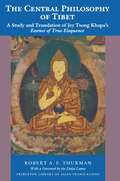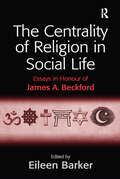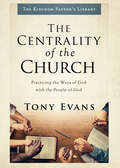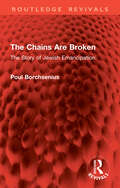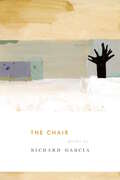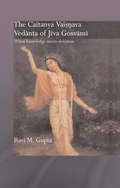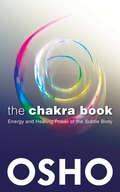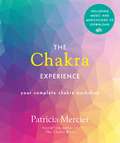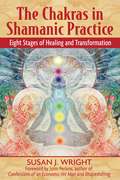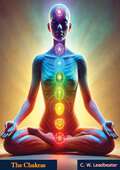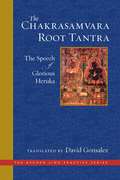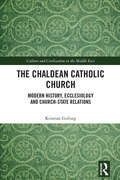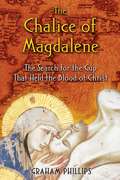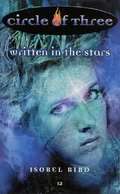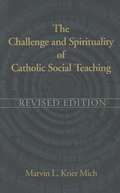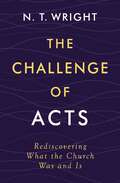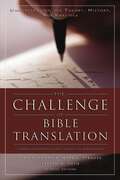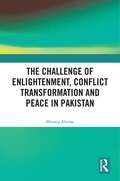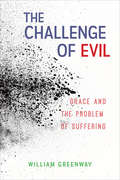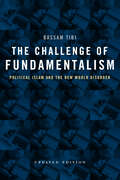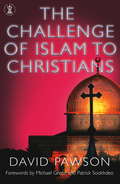- Table View
- List View
The Central Philosophy of Tibet: A Study and Translation of Jey Tsong Khapa's Essence of True Eloquence (Princeton Library of Asian Translations #46)
by Robert A.F. ThurmanThis is the paperback edition of the first full study, translation, and critical annotation of the Essence of True Eloquence by Jey Tsong Khapa (1357-1419), universally acknowledged as the greatest Tibetan philosopher. Robert Thurman's translation and introduction present a strain of Indian Buddhist thought emphasizing the need for both critical reason and contemplative realization in the attainment of enlightenment. This book was originally published under the title Tsong Khapa's Speech of Gold in the "Essence of True Eloquence." ? "I am very happy that Tsong Khapa's masterpiece of Tibetan Buddhist philosophy has been translated into English, and can now be studied by Western philosophers and practitioners of Buddhism. It has long been one of my favorite works, and I hope that others will appreciate its deep thought and lucid insights as we have for centuries in Tibet."--From the foreword by the Dalai Lama
The Centrality of Religion in Social Life: Essays in Honour of James A. Beckford
by Eileen BarkerJames A. Beckford's work is internationally acclaimed not only in the sociology of religion, but also in other fields of the social sciences. Beckford has long been arguing that the barriers that have grown up between the different sub-disciplines should be broken down, with those specialising in religion becoming more cognisant of new theoretical developments, and sociologists in general becoming more aware of the significance of developments in the religious scene. This book is a collection of essays written in Beckford's honour, drawing on a number of religious themes that have been central to Beckford's interests, whilst also offering a significant contribution to our understanding of the wider society. A central theme is modernity (and its relation to the post-modern), and how religion affects and is affected by the dynamics of contemporary society, with the primary focus of many of the chapters being a concern with how society copes with the minority religions that have become visible with the globalising tendencies of contemporary society. The contributors, who come from America, Asia and various parts of Europe, are all internationally renowned scholars. Beckford's most important publications are listed in an Appendix and the volume opens with a short account of his contribution to sociology by Eileen Barker (the editor) and James T. Richardson.
The Centrality of the Church: Practicing the Ways of God with the People of God (Kingdom Pastor's Library)
by Tony EvansConcise Wisdom from a Pastoral VeteranThe Kingdom Pastor&’s Library is a new series that brings you a succinct, complete pastoral philosophy and training from Tony Evans. The Centrality of the Church will help you sort out the structure and strategies you need to have in place in your congregation. From installing elders and deacons to cross-departmental communication, Dr. Evans gives you an invaluable tutorial in the affairs of Christ&’s church. Faithful. Powerful. Practical. Become a kingdom pastor today.
The Centrality of the Church: Practicing the Ways of God with the People of God (Kingdom Pastor's Library)
by Tony EvansConcise Wisdom from a Pastoral VeteranThe Kingdom Pastor&’s Library is a new series that brings you a succinct, complete pastoral philosophy and training from Tony Evans. The Centrality of the Church will help you sort out the structure and strategies you need to have in place in your congregation. From installing elders and deacons to cross-departmental communication, Dr. Evans gives you an invaluable tutorial in the affairs of Christ&’s church. Faithful. Powerful. Practical. Become a kingdom pastor today.
The Chaining of the Dragon: a Commentary on the Book of Revelation
by Ralph SchreiberEmphasizes the eternal spiritual truths enshrined in the Book of Revelation
The Chains Are Broken: The Story of Jewish Emancipation (Routledge Revivals)
by Poul BorchseniusOriginally published in 1964, this further volume in Poul Borchsenius’ history of the Jewish people, is the story of the emancipation from the time when the Jews lived a segregated life in the ghetto, until the Age of Enlightenment they achieved equality. This was the time of Moses Mendelssohn, the famous philosopher and of the poet Heinrich Heine who gave expression to contemporary thought in his lyrical poetry. It was also the time when the Rothschild dynasty became an economic and political factor in contemporary Europe, and the Dreyfus Affair promoted a new wave of antisemitism. In Eastern Europe, particularly, antisemitism took a violent turn, and it was this that made the founder of Israel, Theodor Herzl, begin to agitate for the establishment of a Jewish national state.
The Chair
by Richard GarciaOne of America's foremost prose poets, Richard Garcia's The Chair simultaneously takes place in the natural world and a speculative world rich in the fabulist tradition: historical figures roam like ghosts, time is pulled and twisted, and narrative spins effortlessly out of language. A core of autobiography grounds these poems that are rife with surprises uniting the mythic and the everyday.Richard Garcia's awards include an NEA, a Pushcart Prize, and the American Poetry Journal Book Prize. He teaches creative writing in the Antioch University Los Angeles Low-Residency MFA program and lives on James Island, South Carolina.
The Chairman
by Harry Krausfrom the book cover.... Something is wrong in Fisher's Retreat. And Police officer Nathan McAllister is caught in the middle without a clue how he got there....he knows one thing for certain. His life will never be the same. He no longer has a job. His wife Abby has become distant and uncaring. And his entire world now revolves around the one question he can not answer: What really happened that fateful day in Fisher's Retreat? The official police report states that a drug bust went awry, but he doubts that is the truth. As Nathan's suspicions grow about that day in Fisher's Retreat, so does his need for the truth. But he has been warned to stop asking questions. Someone doesn't want him to learn what really happened. But The Greater mystery for Nathan is what happened to his marriage. Can Abby love Nathan now? His body no longer works. He needs to be cared for as an infant. Yet, as Abby learns to face Nathan's physical difficulties, she begins to see a side of Nathan that hadn't existed before. A new creation has been born in a broken body.. But just when she feels the love rekindle, Nathan begins to push her away, afraid. Is it too late for both of them?
The Chaitanya Vaishnava Vedanta of Jiva Gosvami: When Knowledge Meets Devotion (Routledge Hindu Studies Series)
by Ravi M. GuptaThe Chaitanya Vaishnava tradition is famous for its depth of devotion to Krishna, the blue-hued Deity. Chaitanya Vaishnavas are known for having refined the practice and aesthetics of devotion into a sophisticated science. This imposing devotional edifice was constructed upon a solid foundation of philosophical argument and understanding. In this book, Ravi Gupta sheds new light on the contribution of Chaitanya Vaishnavism to the realm of Indian philosophy. He explores the hermeneutical tools employed, the historical resources harnessed, the structure of the arguments made, and the relative success of the endeavor. For most schools of Vaishnavism, the supporting foundation consists of the philosophical resources provided by Vedanta. The Chaitanya tradition is remarkable in its ability to engage in Vedantic discourse and at the same time practice an ecstatic form of devotion to Krishna. The prime architect of this balance was the scholar-devotee Jiva Gosvami (ca. 1517 - 1608). This book analyses Jiva Gosvami's writing concerning the philosophy of the Vedanta tradition. It concludes that Jiva's writing crosses 'disciplinary boundaries', for he brought into dialogue four powerful streams of classical Hinduism: the various systems of Vedanta, the ecstatic bhakti movements, the Puranic commentarial tradition, and the aesthetic rasa theory of Sanskrit poetics. With training in and commitments to all of these traditions, Jiva Gosvami produced a distinctly Chaitanya Vaishnava system of theology.
The Chakra Book
by Osho International FoundationA comprehensive and in-depth discussion of thehuman energy centers known as chakras. Thebook offers a unique understanding of how thesecenters, also referred to as "subtle bodies" can beidentified and experienced, along with how theyare related to personal transformation and health.In this volume, Osho gives an overview of theEastern science of the subtle energy centers inthe human body that are sometimes known as"chakras." It is a science that underlies traditionalChinese medicine, Indian Ayurveda, and the practiceof kundalini yoga, among other disciplinesthat recognize the deep connection between mindand body. Osho also shows how these same principlesapply to human psychological growth andmaturation, and the evolution of consciousness.Self-help, Spirituality, Psychology, Meditation,Esoteric, New Age, Health, Yoga. The title willespecially of interest to the large group of peopleinvolved with Yoga, as the book describes in simpleterms, using everyday experiences as examples,what underlies the Kundalini Yoga approach to thehuman energy system.The Chakra Book delivers the 'esoteric science'and understanding in the context of personalgrowth and transformation.
The Chakra Experience: Your Complete Chakra Workshop in a Book (Experience Series #3)
by Patricia MercierThe Chakra Experience is a complete chakra workshop in one book. Interactive and practical, the step-by-step learning programme will guide you towards greater understanding and wisdom.- Exercises help you to tailor the book to your own specific needs- Journaling sections allow you to write your experiences directly into the book- Includes revision work and more advanced exercisesWith practical downloadable digital tracks featuring meditations and inspirational music to bring you into a receptive state for deeper work.
The Chakra Experience: Your Complete Chakra Workshop in a Book (Godsfield Experience Ser. #3)
by Patricia MercierThe Chakra Experience is a complete chakra workshop in one book. Interactive and practical, the step-by-step learning programme will guide you towards greater understanding and wisdom.- Exercises help you to tailor the book to your own specific needs- Journaling sections allow you to write your experiences directly into the book- Includes revision work and more advanced exercisesWith practical downloadable digital tracks featuring meditations and inspirational music to bring you into a receptive state for deeper work.
The Chakras in Shamanic Practice: Eight Stages of Healing and Transformation
by John Perkins Susan J. WrightHow to work with the chakra centers to heal unresolved psychic wounds • Reveals how psychic injuries become lodged within the energy body • Links one major developmental stage with each major chakra • Provides a detailed guide to healing and clearing the tensions each chakra holds The chakra system identifies eight centers in the psycho-anatomy of humans, each one associated with a different part of the physical or energy body. Susan J. Wright, a practicing shaman and Gestalt psychotherapist, uses her own life journey to show that each chakra also is linked to a different stage of emotional and spiritual development. In The Chakras in Shamanic Practice, she identifies eight key developmental stages of life, from birth to old age/death. Each of these life stages has various developmental challenges and potential traumatic events that will likely occur and affect the health and well-being of the individual. Wright explains that life traumas experienced in particular developmental stages become lodged within the energy body as they cling to their corresponding chakra. By identifying and working with the chakra involved, a doorway can be opened to a world of transformative images, allowing powerful shamanic techniques to heal these psychic wounds. Providing both physical exercises and guided meditations that utilize the techniques of soul retrieval, working with power animals, and transcending trauma, Wright offers practitioners a way to gather and nurture the fragmented parts of their energy body and lead themselves to physical, emotional, and spiritual well-being.
The Chakras: How To Focus The Energy Points Of The Body (Elements Ser. #3)
by C. W. LeadbeaterC. W. Leadbeater’s "The Chakras" is a seminal work that offers an in-depth exploration of the ancient and mystical energy centers within the human body. As a prominent figure in the Theosophical Society and a renowned clairvoyant, Leadbeater brings his unique insights and experiences to bear in this comprehensive study of the chakras, blending Eastern spiritual traditions with Western esoteric knowledge.In "The Chakras," Leadbeater elucidates the nature, function, and significance of these vital energy centers, providing readers with a detailed understanding of their role in physical, emotional, and spiritual well-being. His clear and accessible writing makes complex metaphysical concepts understandable to both newcomers and seasoned practitioners of spiritual studies.Key themes include:Detailed Descriptions: Leadbeater offers precise and vivid descriptions of each of the seven major chakras, including their location, appearance, and associated colors and symbols. He explains how each chakra influences various aspects of human life, from physical health to emotional stability and spiritual growth.Functions and Powers: The book delves into the specific functions and powers of the chakras, highlighting how they act as conduits for universal life force energy. Leadbeater discusses how the chakras govern different physiological systems and psychological states, emphasizing their interconnectedness.Development and Activation: Leadbeater provides practical advice on how to develop and activate the chakras through meditation, visualization, and other spiritual practices. He shares techniques for enhancing one’s sensitivity to these energy centers and harnessing their potential for personal transformation.The Chakras" is an essential read for anyone interested in understanding the intricate energy systems of the human body and their profound impact on health and consciousness. C. W. Leadbeater’s authoritative and insightful work continues to be a cornerstone in the study of esoteric anatomy and spiritual development.
The Chakrasamvara Root Tantra: The Speech of Glorious Heruka (The Dechen Ling Practice Series)
by David GonsalezA translation of a foundational scripture in beautiful, lyrical translation, perfect for recitation.A key text for one of the most important Buddhist tantric traditions, the Chakrasamvara Root Tantra has been passed down to us from the ancient mahasiddhas of India, such as the great yogi Saraha. This foundational ritual text is one of the earliest of the yogini tantras, tantric scriptures that emphasize female deities. This melodic translation by David Gonsalez (Ven. Losang Tsering) maintains the poetic structure of the original, making it ideal for practitioners and harmonious to recite. It is at once an object of devotion, a profound instruction, and a beautiful poem meant to inspire spiritual seekers.
The Chaldean Catholic Church: Modern History, Ecclesiology and Church-State Relations (Culture and Civilization in the Middle East)
by Kristian GirlingThis book provides a modern historical study of the Chaldean Catholic Church in Iraq from 2003 to 2013, against a background analysis of the origins and ecclesiological development of the Chaldean community from the sixteenth century onwards. The book offers an insight into the formation of Chaldean ecclesiological identity and organisation in the context of the Chaldeans as a community originating from the ecclesial traditions of the Church of the East and as an Eastern Catholic Church in union with the Holy See. The book argues for the gradual and consistent development of a Chaldean identity grounded and incarnated in the Mesopotamian-Iraqi environment, yet open to engaging with cultures throughout the Middle East and West Asia and, especially since 2003, to Europe, North America and Australasia. It also examines the effects of religious and administrative policies of the governors of Mesopotamia-Iraq on the Chaldeans, from their formation in the sixteenth century until the installation of the new Chaldean patriarch, Louis Raphael I Sako, in March 2013. Furthermore, the book provides a unique analysis of the history of Iraq, by placing the Chaldeans fully into that narrative for the first time. Providing a thorough overview of the history of the Chaldeans and an in-depth assessment of how the 2003 invasion has affected them, this book will be a key resource for students and scholars of Middle East Studies, Modern History, History of Christianity, as well as for anyone seeking to understand the modern status of Christians in Iraq and the wider Middle East.
The Chalice of Magdalene: The Search for the Cup That Held the Blood of Christ
by Graham PhillipsReveals the discovery of an artifact that many experts believe may be the Holy Grail • Traces the journey of the Grail from the Holy Land to Rome and eventually to a ruined chapel in Shropshire, England • Uncovers new evidence identifying the historical King Arthur and his connection to the Holy Grail The popular Arthurian stories of the Middle Ages depict the Holy Grail as Christ’s cup from the Last Supper, which was believed to have been endowed with miraculous healing powers and the ability to give eternal life to whoever drank from it. A much earlier tradition, however, claimed the Grail was the vessel used by Mary Magdalene to collect Christ’s blood when he appeared to her after rising from the tomb. While many vessels were claimed to have been the true Grail, there was only one thought to have been the chalice used by Mary. From Jesus’ empty tomb, where it remained for almost 400 years, this holy relic known as the Marian Chalice was taken to Rome by the mother of the first Christian emperor, Constantine the Great. It was then smuggled from Rome in 410 A.D., according to the fifth-century historian Olympiodorus, to save it from the barbarians who sacked the city. Well into the Middle Ages legend persisted that it had been taken to safety in Britain, the last outpost of Roman civilization in Western Europe.This journey to England, and what happened to the Chalice there, is the focus of this book. Graham Phillips’s research uncovers the secret legacy of an ancient noble family over generations and a trail of clues hidden in the English countryside that lead to a mysterious grotto, a forgotten attic, and the lost chalice. In tracing the relic, Phillips offers the inside story behind an astonishing adventure that results in the identification of the historical King Arthur and the location of one of the most powerful symbols in Western tradition.
The Challenge Box, (Circle of Three Book #14)
by Isobel BirdKate, Annie, and Cooper are poised at the brink of Wiccan initiation after a year of intense study. All three girls must choose a final challenge as a Wiccan initiate--will Kate's prove too difficult?
The Challenge and Spirituality of Catholic Social Teaching, Revised Edition
by Marvin L. Krier MichThis work offers readers the insight and inspiration to live out the gospel of Jesus Christ, the 'glad tidings to the poor,' here and now. Mich weaves together the biblical tradition and the wisdom of Catholic social teaching with the stories if saints and spiritual leaders, contemporary and historical.
The Challenge of Acts: Rediscovering What the Church Was and Is
by N. T. WrightA new and inviting introduction to the Acts of the Apostles from New Testament scholar and theologian N. T. Wright.Acts is a substantial book. It sits right in the middle of the New Testament, looking back to the four Gospels and ahead to the mission of the early church. It provides a framework for our understanding of the letters; but it does more than that. Acts offers a sophisticated and nuanced view of what it means to think of the gospel of Jesus, Israel's Messiah, going out into the world over which Israel's Messiah claims the status of Lord.This Christian movement and thinking, detailed in Acts, entailed confronting the wider culture of the Greek and Roman world, as well as the culture of the Jewish world, which provides us today with an important message as we ourselves face new questions about gospel and contemporary culture.From the renowned author of Into the Heart of Romans, N. T. Wright brings to the book of Acts his expert's eye on theological nuance and cultural context, distilling it down into an introductory commentary, perfect for anyone looking to take their own reading a little deeper and discover the profound (and often forgotten) potential of the church and the Way of Jesus Christ.
The Challenge of Bible Translation: Communicating God's Word to the World
by Mark L. Strauss Glen G. Scorgie Steven M. VothAn In-Depth Look at Bible Translation ·The concerns, issues, and approaches ·The history ·The ins and outs of the translation task With a reach that covers the entire globe, the Bible is the best-selling, most earnestly studied book of all time. It has been translated into well over 1,000 languages, from those of global reach such as English, French, and Arabic, to a myriad of isolated tribal tongues. Yet while most readers of the English Bible have a favorite version, few understand how the different translations came about, or why there are so many, or what determines whether a particular translation is trustworthy. Written in tribute to one of today’s true translation luminaries, Dr. Ronald Youngblood, The Challenge of Bible Translation will open your eyes to the principles, the methods, the processes, and the intricacies of translating the Bible into language that communicates clearly, accurately, and powerfully to readers of many countries and cultures. This remarkable volume marshals the contributions of foremost translators and linguists. Never before has a single book shed so much light on Bible translation in so accessible a fashion. In three parts, this compendium gives scholars, students, and interested Bible readers an unprecedented grasp of: 1. The Theory of Bible Translation 2. The History of Bible Translation 3. The Practice of Bible Translation The Challenge of Bible Translation will give you a new respect for the diligence, knowledge, and care required to produce a good translation. It will awaken you to the enormous cost some have paid to bring the Bible to the world. And it will deepen your understanding of and appreciation for the priceless gift of God’s written Word. Contributors Kenneth L. Barker D. A. Carson Charles H. Cosgrove Kent A. Eaton Dick France David Noel Freedman Andreas J. Köstenberger David Miano Douglas J. Moo Glen G. Scorgie Moisés Silva James D. Smith III John H. Stek Mark L. Strauss Ronald A. Veenker Steven M. Voth Larry Lee Walker Bruce K. Waltke Walter W. Wessel Herbert M. Wolf
The Challenge of Enlightenment, Conflict Transformation and Peace in Pakistan
by Moonis AhmarThis book looks at the process of cultural enlightenment in the context of Pakistan. It undertakes an interesting and in-depth research focusing on how the world’s second largest Muslim state can learn from Europe’s heritage of enlightenment. It studies why Pakistan lacks a process of awakening and what the scope of cultural enlightenment in Pakistan is against the backdrop of militant Islam. The author argues that cultural enlightenment can help promote positive conflict transformation in Pakistan and discusses the ways in which challenges to establishing a culture of reasoning, tolerance, accommodation, social justice and peace can be dealt with. A unique contribution, this book will be of interest to students and researchers of philosophy, political science, history, international relations, South Asian studies and religious studies. It will also appeal to think tanks, policymakers and general readers interested in these topics.
The Challenge of Evil: Grace And The Problem Of Suffering
by William GreenwayBelief in God in the face of suffering is one of the most intractable problems of Christian theology. Many respond to the spiritual challenge of evil by ignoring it, blaming God, or insisting on the inherent meaninglessness of life. In this book, William Greenway contends that we don't have to deny our moral selves by either ignoring evil or abandoning our moral sensibilities toward it. We can open our eyes fully to suffering and evil, and our own complicity in them. We can do so because it is only in this full acceptance of the world's guilt and our own that we make ourselves fully open to agape, to being seized by love of others and God. Inspired by the Jewish philosopher Emmanuel Levinas and the Christian novelist Fyodor Dostoyevsky, The Challenge of Evil lovingly explains how we can look squarely at the overwhelming suffering in the world and still, by grace, have faith in a good and loving God.
The Challenge of Fundamentalism: Political Islam and the New World Disorder (Comparative Studies in Religion and Society #9)
by Bassam TibiLong before the tragic events of September 11, 2001, Islamic fundamentalism was exerting a significant influence in nearly every corner of the world. Bassam Tibi, a widely recognized expert on Islam and Arab culture, offers an important and disquieting analysis of this particular synthesis of religion and politics. A Muslim and descendant of a famous Damascene Islamic scholar family, Tibi sees Islamic fundamentalism as the result of Islam's confrontation with modernity and not only--as it is widely believed--economic adversity. The movement is unprecedented in Islamic history and parallels the inability of Islamic nation-states to integrate into the new world secular order. For this updated edition, Tibi has written a new preface and lengthy introduction addressing Islamic fundamentalism in light of and since September 11.
The Challenge of Islam to Christians
by David PawsonThe Challenge of Islam to Christians is David Pawson's most important - and most controversial - prophetic message to date. Moral decline and erosion of a sense of ultimate truth has created a spiritual vacuum in the United Kingdom. David Pawson believes Islam is far better equipped than the Church to move into that gap and it will not be long before it becomes the country's dominant religion.Based on the audio and video recordings on which he first announced his message, this book unpacks and explains the background behind Pawson's claims, and - crucially - sets out a positive blueprint for the Church's response. Christians must rediscover and demonstrate to society the three qualities that make Christianity unique: Reality, Relationship and Righteousness.
